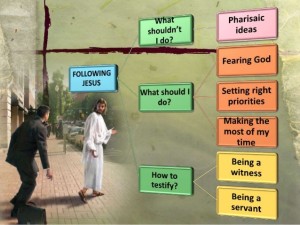22nd Sunday in Ordinary Time, Year B – The Pharisees

22nd Sunday in Ordinary Time, Year B – The Pharisees
How many times have we heard, or perhaps even said ourselves: “So-and-so is a Pharisee.”
Today’s Gospel (Mark 7:1-8, 14-15, 21-23) offers us a good opportunity to understand the role of the Pharisees in Judaism, and why Jesus and others had such strong feelings against their behavior. Who were the Pharisees of Jesus’ time, and who are their modern-day contemporaries?
The doctrine of the Pharisees is not opposed to that of Christianity. At the time of Jesus, the Pharisees were the “conservative party” within Judaism. They adhered strictly to the Torah and the Talmud and were outwardly very moral people. They were the leaders of the majority of the Jews and were revered by their followers for their religious zeal and dedication. Their main opposition was the party of the Sadducees, who were the “liberal party” within Judaism. The Sadducees were popular among the high-class minority.
Pharisees are mentioned when John the Baptist condemns them and the Sadducees in Matthew 3:7-10: “But seeing many of the Pharisees and Sadducees coming to his baptism, he said to them, offspring of vipers! Who warned you to flee from the wrath to come?” Why would John the Baptizer say that the Pharisees, who were outwardly moral, zealous, and religious, were the offspring of vipers?
Jesus reserved his harshest words for the Pharisees as well. In Matthew 16:6, Jesus warned the disciples, “Watch and take heed from the leaven of the Pharisees and Sadducees.” What were the disciples to beware of? Were they to beware of the immorality of the Pharisees and Sadducees?
Adherence to the law
It’s important to state that most Pharisees were good, law-abiding and well-intentioned people. There were some Pharisees who were caught up only in external prescriptions, but they would have been criticized by other Pharisees even as the prophet Isaiah criticized hypocrisy in the past. Jesus did not condemn Pharisaism as such or all Pharisees.
 The Pharisees self-righteously and hypocritically despised all others who did not meet the same standard of law keeping that they met.
The Pharisees self-righteously and hypocritically despised all others who did not meet the same standard of law keeping that they met.
The Pharisees “relied on themselves, that they are righteous.” They believed that their own works — their doing what God commands and their abstaining from what God forbids — were what gained and maintained God’s favor and recommended them to God. The Pharisees self-righteously and hypocritically despised all others who did not meet the same standard of law keeping that they met.
They would not eat with the tax collectors and other sinners, because they were self-righteously aloof. They spent their time murmuring about who was eating and drinking with Jesus. Jesus said to them, “It is not the healthy who need a doctor, but the sick. I have not come to call the righteous, but sinners to repentance”(Luke 5:31-32).
No etiquette lesson!
In today’s Gospel passage, (Mark 7:1-8, 14-15, 21-23), the Pharisees and scribes come from Jerusalem to investigate Jesus. Jesus abolishes the practice of ritual purity and the distinction between clean and unclean foods. The watchdogs of religious tradition cite Jesus for running a rather lax operation! Some of his disciples were eating with unwashed hands (Mark 7:2). Pharisees and scribes seize this infraction of the law and challenge Jesus,
“Why do your disciples not live according to the tradition of the elders, but eat with defiled hands?”(v. 5).
Jesus doesn’t respond with an etiquette lesson or an explanation of personal hygiene. Instead, he calls the Pharisees and scribes what they are: “you hypocrites” (v. 6). Quoting Isaiah, Jesus exposes the condition of the legalists’ hearts. They cling to human precepts and put their trust in the traditions of their elders over the commandment of God (v. 8).
Against the Pharisees’ narrow, legalistic, and external practices of piety in matters of purification (Mark 7:2-5), external worship (7:6-7), and observance of commandments, Jesus sets in opposition the true moral intent of the divine law (7:8-13).
But he goes beyond contrasting the law and Pharisaic interpretation of it. Mark 7:14-15 in effect sets aside the law itself in respect to clean and unclean food. Jesus’ point is well taken — and most Pharisees would have agreed — that internal attitude is more important than the externals of the law.
Contemporary Pharisees
Who are the modern-day Pharisees and their followers? The blind modern-day Pharisees and their blind followers are very religious, moral, zealous people. They strive to keep God’s law, and they are zealous in their religious duties. They diligently attend Church every Sunday. They are hardworking, outwardly upright citizens. They keep themselves from and preach against moral evil.
In addition to being moral and religious and zealous, modern-day Pharisees and their followers do not believe that salvation is conditioned on the work of Christ alone; instead, they believe that salvation is ultimately up to human efforts and what the sinner adds to Christ’s work!
In contrast to the modern-day Pharisees and their followers, true Christians are those who boast in Christ crucified and no other, meaning that they believe that Christ’s work ensured the salvation of all whom He represented and is the only thing that makes the difference between salvation and condemnation. They know that their own efforts form absolutely no part of their acceptance before God. They rest in Christ alone as their only hope, knowing that it is the work of Christ by the grace of God that guarantees salvation.
Jesus showed that only those who were sinners in need of a healer, who do not have righteousness in themselves, who are devoid of divine entitlement, who do not deserve to be in fellowship with God, are the ones He came to call to repentance.
Recent Sermons

Easter Sunday – The Resurrection
April 14, 2017

4th Sunday of Lent Year A – The Man Born Blind
March 27, 2017

3rd Sunday of Lent Year A – The Samaritan Woman at the Well
March 20, 2017


